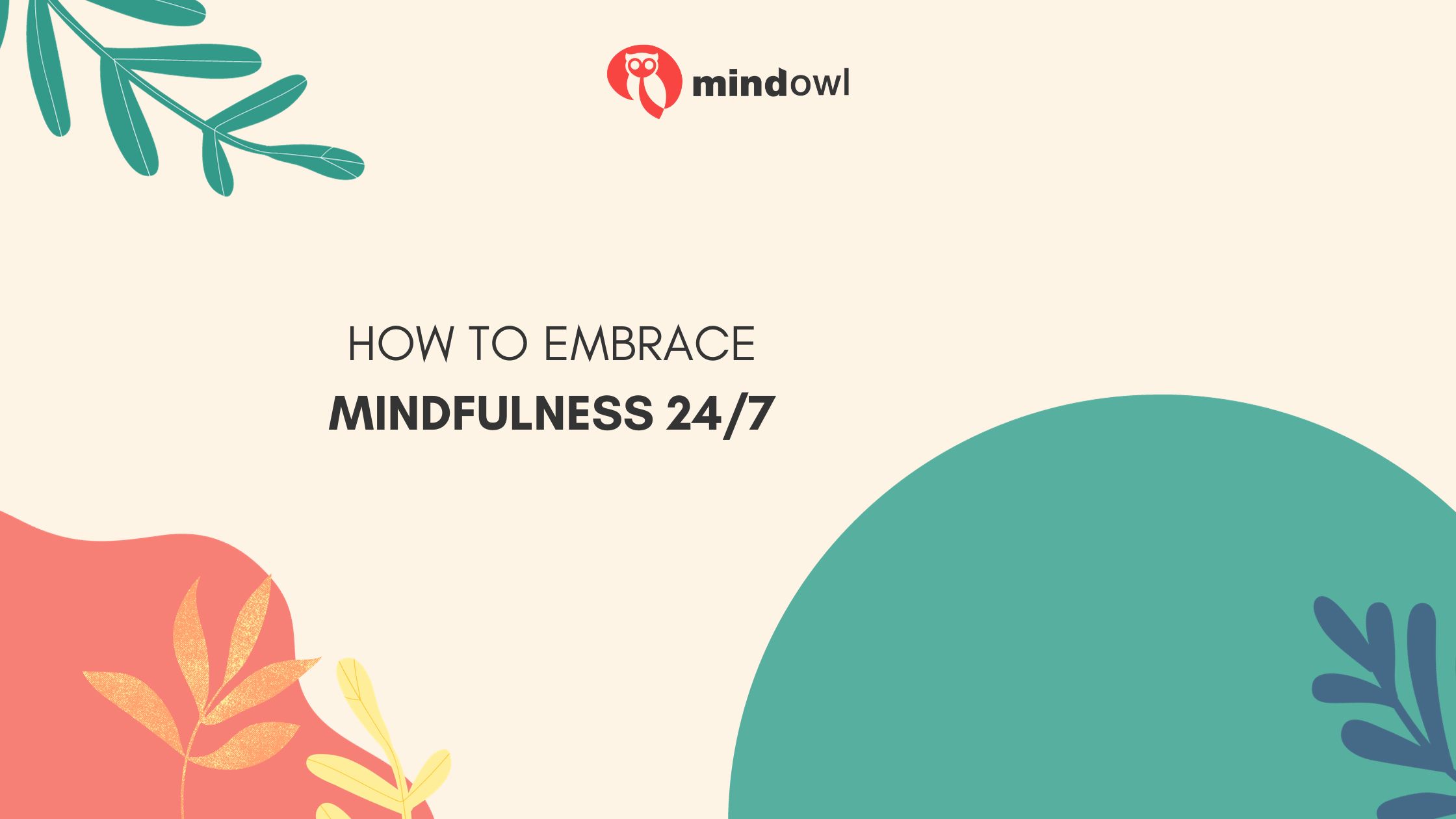Mindfulness is an invaluable tool to cultivate self-awareness, reduce stress, and enjoy life with greater presence. But can we be mindful 24/7?
The truth is, that being able to remain mindful ‘in the moment’ and act in accord with your values takes practice—the kind of dedicated commitment that lasts well beyond the end of your meditation session.
This blog will explore the various challenges we face as we strive to make mindfulness part of our daily routine while uncovering the myriad benefits it yields when embraced consistently.
Key Takeaways
- Mindfulness means being fully present in the moment, without judgment or attachment to thoughts or emotions.
- Mindfulness has many benefits, including reducing stress, improving focus and clarity, enhancing emotional well-being, and increasing overall quality of life.
- You can practice mindfulness throughout the day by using “stealth” techniques, practicing mindful listening and speaking, and engaging fully in conversations.
- Mindful breathing, mindful eating, and being aware of your surroundings are practical ways to incorporate mindfulness into everyday activities.
What is Mindfulness?

Mindfulness is the practice of bringing one’s attention to the present moment, without judgment or attachment to thoughts or emotions, and being fully aware of one’s surroundings and experiences.
It has been proven to reduce stress, increase focus and clarity, improve emotional well-being, and enhance overall quality of life.
Definition
Mindfulness means being totally in the now. It’s about watching all that happens around you and your own actions too, without feeling lost or upset. You can feel this way when you meditate, or just live every day with care.
This idea comes from old Eastern and Buddhist ideas. Being mindful needs active focus on the present moment and also a calm understanding of one’s thoughts without making any judgments about them.
Benefits
Mindfulness has a lot of good things. Here are some:
- It helps you know what’s really going on in your mind. This is called metacognitive awareness.
- Mindful practices can make you feel less sad or worried. You may also find it helps to keep your blood pressure low.
- When we pay attention to our feelings, we make better choices. Mindfulness can help with this.
- It fights off stress and boosts how happy you feel overall.
- Paying close attention to how your body feels can make you healthier and happier.
- Mindfulness lets us understand and accept how our bodies’ feelings shape our emotions.
How to Practice Mindfulness 24/7

Practice mindfulness throughout the day with “stealth” techniques, mindful listening and speaking, and engaging fully in conversations.
“Stealth” mindfulness techniques
Mindfulness can be a part of your whole day thanks to “Stealth” mindfulness techniques. These special tips let you weave mindful moments into your day. You don’t need to sit still or close your eyes for them.
- Take a deep breath before answering the phone. This helps you slow down and talk with care.
- Eat one meal each day in quiet. Focus on how the food tastes, smells, and feels.
- When waiting in line, stand tall and feel your feet on the ground.
- Listen fully when people talk to you. Don’t think about what you’ll say next.
- Set a timer to take a one – minute break every hour at work. Rest your eyes and think about how your body feels.
- Before you sleep, think about three things that made you happy today.
Guidelines for mindful listening and speaking
Mindful listening and speaking are essential components of practicing mindfulness. Here are some guidelines to help cultivate these skills:
- Be fully present: Give your undivided attention to the speaker, focusing on their words and non-verbal cues.
- Eliminate distractions: Turn off notifications, put away electronic devices, and create a quiet environment.
- Avoid interrupting: Allow the speaker to finish expressing their thoughts before responding or asking questions.
- Practice active listening: Engage with the speaker by nodding, making eye contact, and providing verbal affirmations.
- Suspend judgment: Listen without forming opinions or making assumptions about what the speaker is saying.
- Show empathy: Demonstrate understanding and compassion by acknowledging the speaker’s emotions and perspectives.
- Reflect before responding: Take a moment to process what has been said before formulating a thoughtful response.
- Speak mindfully: Choose your words carefully, speaking slowly and clearly to convey your message effectively.
- Be concise: Avoid rambling or going off-topic; instead, strive for clarity and brevity in your communication.
Connecting in conversation
Mindfulness can greatly improve our ability to connect with others in conversation. When we practice mindfulness, we become more present and attentive, allowing us to truly listen and engage with what the other person is saying.
This means putting aside distractions like our phones and giving the person our full attention. By being mindful during conversations, we can pick up on subtle cues, emotions, and body language that we might otherwise miss.
This helps build deeper connections with others and fosters a sense of empathy and understanding. So next time you’re having a conversation, try to be fully present and give your undivided attention – you might be surprised at how much better your connection becomes.
Mindfulness in Daily Life
Practice mindfulness in daily activities such as breathing, eating, and being aware of your surroundings.
Mindful breathing
Mindful breathing is a simple and effective way to practice mindfulness throughout the day. It involves focusing your attention on your breath, paying close attention to each inhale and exhale.
By bringing awareness to your breath, you can anchor yourself in the present moment and cultivate a sense of calm and clarity. Mindful breathing can be done anywhere, at any time, making it an accessible tool for reducing stress and increasing self-awareness.
With regular practice, mindful breathing can help improve concentration, manage emotions, and enhance overall well-being. So take a moment right now to pause, take a deep breath in..and let it go.
Mindful eating
Mindful eating is a practice that involves paying attention to what and how we eat. It’s about being fully present in the moment and using our senses to savor each bite. By practicing mindful eating, we can develop a better relationship with food and improve our physical health.
This means listening to our body’s cues of hunger and fullness, noticing the flavors, textures, and smells of our food, as well as being aware of any emotional or mental associations we may have with eating.
Mindful eating can help us slow down, enjoy our meals more fully, and make healthier choices that honor our body’s needs.
Mindful awareness of surroundings
Mindful awareness of surroundings is an essential aspect of mindfulness practice. It involves paying attention to the present moment and being fully aware of our environment. Instead of getting lost in thoughts or worries, we focus on what is happening around us right now.
This can include noticing the sights, sounds, smells, and sensations in our surroundings. By cultivating this kind of awareness, we can develop a deeper appreciation for the world around us and fully engage with our experiences.
Mindful awareness of surroundings also helps to ground us in the present moment and bring a sense of calm and clarity to our minds. So next time you’re out for a walk or sitting in a park, take a moment to truly observe your surroundings – it might just bring you closer to that state of mindful presence.
Overcoming Obstacles to Mindfulness
Overcoming Obstacles to Mindfulness: Learn how to overcome common mind traps, cultivate self-compassion, and focus on the present moment. Discover practical tips to maintain mindfulness in your daily life.
Read more for effective techniques to master mindfulness 24/7.
Common mind traps
Mind traps are common obstacles to mindfulness. Here are eight mind traps that can hinder your ability to stay present:
- Dwelling on the Past: Ruminating over past events prevents you from fully experiencing the present moment.
- Worrying about the Future: Constantly worrying about what might happen keeps you from being fully engaged in the here and now.
- Judgment and Criticism: Being overly critical of yourself or others creates a negative mindset that distracts from mindfulness.
- Multitasking: Trying to do too many things at once divides your attention and prevents you from being fully present.
- Over-Identification with Thoughts: Getting caught up in your thoughts and believing them to be true can lead to unnecessary stress and anxiety.
- Reacting Automatically: When you automatically react to situations without thinking, you lose the opportunity for intentional and mindful responses.
- Seeking External Validation: Constantly seeking approval from others takes away from your own inner awareness and undermines mindfulness.
- Impatience: Focusing on the desire for things to be different than they are right now creates a sense of restlessness and dissatisfaction.
Cultivating self-compassion
Cultivating self-compassion is an important aspect of mastering mindfulness 24/7. It involves being kind and understanding towards ourselves, especially when facing challenges or setbacks.
Research shows that healthcare professionals who have higher levels of self-compassion experience less burnout and compassion fatigue. By nurturing self-awareness, practicing mindfulness, and overcoming barriers, we can build resilience and strengthen our ability to be compassionate towards ourselves.
According to Buddhist monk Thich Nhat Hanh, cultivating mindful self-compassion is an act of love. It allows us to treat ourselves with kindness and understanding as we navigate through the ups and downs of life.
Focusing on the present moment
Focusing on the present moment is a key aspect of mindfulness practice. It means bringing our attention fully to what is happening right now, without getting caught up in thoughts about the past or worries about the future.
By focusing on the present moment, we can cultivate a sense of peace and calm, as well as increase our ability to respond wisely to whatever arises. This involves paying attention to our thoughts, feelings, and sensations in a nonjudgmental way, allowing us to fully experience each moment as it unfolds.
Focusing on the present moment can help us become more aware of ourselves and our surroundings, leading to increased clarity and a deeper sense of connection with ourselves and others.
Practicing mindfulness in daily life allows us to bring this focus into everyday activities such as eating, walking, or even doing household chores. By intentionally bringing awareness to these moments, we can savor them more fully and find joy in simple pleasures.
Mindful breathing is one technique that can help anchor us in the present moment throughout the day. Taking slow deep breaths helps calm our nervous system and brings us back into our bodies when we find ourselves caught up in stress or distractions.

Maintaining Mindfulness 24/7
Incorporating mindfulness into daily activities and creating a routine for regular practice are key to maintaining present moment awareness throughout the day.
Creating a daily mindfulness routine
To maintain mindfulness 24/7 and master present moment awareness, it is important to create a daily mindfulness routine. Here are some ways to incorporate mindfulness into your daily life:
- Start your day with intention: Begin each morning by setting an intention for the day. This can be a simple phrase or affirmation that reminds you to stay present and mindful throughout the day.
- Practice mindful breathing: Take a few moments each day to focus on your breath. Close your eyes and take slow, deep breaths, paying attention to the sensation of air entering and leaving your body. This can help ground you in the present moment and reduce stress.
- Incorporate mindfulness into everyday tasks: Instead of rushing through daily activities like showering, eating, or brushing your teeth, try to bring awareness to these tasks. Pay attention to the sensations, smells, textures, and tastes involved, fully immersing yourself in the experience.
- Schedule moments of stillness: Find time throughout the day to pause and be still. Even just a few minutes of quiet reflection can help bring you back to the present moment and increase mindfulness.
- Practice gratitude: Take a few moments each day to reflect on what you are grateful for. It could be something as small as a warm cup of coffee or a beautiful sunset. This practice helps cultivate mindfulness by fostering appreciation for the present moment.
- Engage in mindful movement: Incorporate mindful movement practices such as yoga or walking meditation into your daily routine. These activities encourage you to pay attention to your body and surroundings while promoting relaxation and increased body awareness.
Mindful self-care practices
- Take moments throughout the day to check in with yourself and assess your needs. Pause and ask yourself, “How am I feeling? What do I need right now?”
- Practice self – compassion by treating yourself with kindness and understanding. Be gentle with yourself when facing challenges or setbacks.
- Engage in activities that bring you joy and nourish your soul. It could be anything from reading a book, taking a walk in nature, or listening to music.
- Prioritize restful sleep by establishing a bedtime routine that promotes relaxation. Create a calming environment and avoid electronic devices before bed.
- Nurture your body through mindful movement, such as yoga or tai chi. Pay attention to how your body feels during exercise and focus on the sensations.
- Develop healthy eating habits by choosing nutritious foods mindfully. Slow down while eating, savor each bite, and pay attention to the flavors and textures.
- Set boundaries to protect your energy and well-being. Learn to say no when necessary, delegate tasks, and create space for yourself.
- Practice gratitude by reflecting on what you are grateful for each day. Write down three things you appreciate or express gratitude silently.
- Seek support from loved ones or professional resources when needed. Reach out for help if you’re feeling overwhelmed or struggling with your mental health.
- Journaling can be a helpful tool for self-reflection and self-expression. Write about your thoughts, emotions, or any insights gained throughout the day.
Remember, practicing mindful self-care is an ongoing process that requires patience and consistency. By prioritizing self-care, you can cultivate a sense of peace and well-being in your daily life.
Tips for incorporating mindfulness into daily activities
- Start your morning with a few minutes of mindful breathing to set a positive tone for the day.
- Practice mindful eating by savoring each bite and paying attention to the flavors and textures of your food.
- Take short breaks throughout the day to do a quick body scan, noticing any tension or discomfort and allowing yourself to relax.
- Use everyday tasks like washing dishes or brushing your teeth as opportunities for mindfulness, fully focusing on the sensations and movements involved.
- Be present in conversations by truly listening to others without interrupting or thinking about what you’ll say next.
- Incorporate mindful movement into your routine through activities like yoga, stretching, or going for a walk outside.
- Take moments throughout the day to pause, take a deep breath, and bring yourself back to the present moment.
- Practice gratitude by regularly reflecting on and appreciating the things you are grateful for in your life.
- Set reminders in your phone or use mindfulness apps as prompts to bring awareness back to the present moment.
- End each day with a brief reflection on how you brought mindfulness into your daily activities and acknowledge any progress made in cultivating present moment awareness.
Remember, incorporating mindfulness into daily activities is about finding small moments throughout the day to bring yourself back to the present moment and cultivate awareness in everything you do.
Conclusion
In conclusion, mastering mindfulness 24/7 is possible with easy techniques to cultivate present moment awareness. By practicing mindfulness in daily life and overcoming obstacles that may arise, individuals can maintain a state of mindful presence throughout their day.
With dedication and the willingness to incorporate mindfulness into various aspects of life, anyone can experience the transformative benefits of being fully present in each moment.
FAQs
1. What is mindfulness meditation?
Mindfulness meditation is a meditative practice that helps the body and mind live in the present moment, focusing on feelings and thoughts without judgement.
2. Can I use mindfulness hacks outside of formal meditation time?
Yes! Mindfulness hacks can be used 24 hours a day, whenever you want to refine your focus on what’s happening now. These short techniques are easy to integrate into everyday practices.
3. What if I drift away or my thoughts wander during mindful activities?
It’s normal for your attention to wander during mindfulness exercises. When this happens, just bring your attention back effortlessly to your physical sensation or breath.
4. Do I need special apps like Headspace for mastering mindfulness?
You don’t have to rely only on apps like Headspace for mindfulness training; simple things such as deep breathing exercises or practicing awareness of physical sensations can help deepen your ability in staying present.
5. I’m new at this—how do I stay mindful throughout the day without forgetting about it?
Good intentions play a big role here: start with something simple, perhaps try paying utmost attention to one task each hour and gradually increase the frequency as becoming more mindful gets easier with practice!
6. Can practicing mindfulness contribute towards improved wellbeing?
Absolutely! Cultivating present-moment awareness can reduce stress levels by helping us not ruminate over past events or worry about future outcomes but rather discern our experience in real-time, greatly contributing towards better mental health and overall wellbeing.
MindOwl Founder – My own struggles in life have led me to this path of understanding the human condition. I graduated with a bachelor’s degree in philosophy before completing a master’s degree in psychology at Regent’s University London. I then completed a postgraduate diploma in philosophical counselling before being trained in ACT (Acceptance and commitment therapy).
I’ve spent the last eight years studying the encounter of meditative practices with modern psychology.


